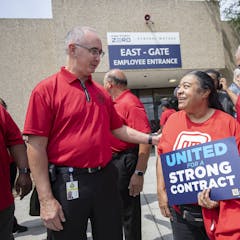
Articles on Labor Day
Displaying 1 - 20 of 27 articles

Many of the reasons for strikes now – low compensation, technological change, job insecurity and safety concerns – mirror the motives that workers had for walking off the job in decades past.

With more than 2 million migrant workers finding food processing jobs in rural America, their struggle to find adequate health care remains elusive.

A strike would shake up the auto industry, even though both the union’s ranks and the share of the US automotive market controlled by GM, Ford and Stellantis have been shrinking for decades.

If any industry is crying out for unionization, it’s this one.

Public support for unions is at a near 60-year high. Meanwhile, self-organizers at major American chains are spearheading a new movement to mobilize.

Often overlooked in the immigration debate are the contributions of migrants, such as how they helped organize workers in the 1990s.

Inspired by real events, the films tackle issues of race, gender and class in ways that will resonate with many of today’s viewers.

At the height of Reaganism, close to half of Americans believed a phrase popularized by Karl Marx actually derived from the US Constitution. It doesn’t, but scholars have traced it to the Bible.

The philosopher Simone Weil offers an illuminating perspective for our work life.

Unionization is at a record low in part thanks to the tactics these firms use on behalf of companies and other organizations.

If your job doesn’t currently involve automation or artificial intelligence in some way, it likely will soon. Computer-based worker surveillance and performance analysis will come, too.

Central Americans who came to the US in the 1980s fleeing civil war drew on their background fighting for social justice back home to help unionize farmworkers, janitors and poultry packers in the US.

Americans want more say about their benefits, training and other important issues at work.

As technology and the labor market rapidly evolve, so too does the value of a high school diploma. Despite the changes, one thing remains true: Education is still the cornerstone of career success.

The negative effects of job loss have been well-documented and fairly well-understood. But why would studies also suggest that health improves during a recession? The reasons may surprise you.

Rather than fret about how many jobs future technologies will destroy, we should focus on how to shape them so that they complement the workforce of tomorrow.

The holiday began as a strike against excessive workweeks but now bears little resemblance to its worker-centric origins, even as the founders’ gains are slowly lost.

Robots have the potential to help support a growing population that wants to age in their own homes. But those helpful machines won’t be the humanoid butlers of science fiction.

Nearly one in five employed Americans is bound by a contract restricting moves to rival companies. Here’s one way to make those arrangements less common.

Although workers at a Nissan auto plant in Mississippi rejected a proposal to join the United Auto Workers Union, organized labor has reason to be optimistic about its future.
